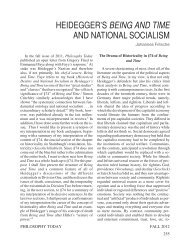SPINOZA'S VIRTUOUS PASSIONS
SPINOZA'S VIRTUOUS PASSIONS
SPINOZA'S VIRTUOUS PASSIONS
You also want an ePaper? Increase the reach of your titles
YUMPU automatically turns print PDFs into web optimized ePapers that Google loves.
760 MATTHEW J. KISNER<br />
the passions would seem to represent the sort of bondage which concerns<br />
Spinoza. Partly on this basis, it is often assumed that Spinoza<br />
understood a life of virtue as one of pure activity, with as few passions<br />
as possible. 4 This paper aims to show that Spinoza reserves an<br />
important role for the passions in a life of virtue. 5 Seen in a certain<br />
light, this claim might appear trivial: the passions, like sensations, are<br />
knowledge of the first kind, which provides us with the particular<br />
knowledge about external things necessary for comporting ourselves<br />
in the world. Since virtue amounts to increasing one’s power, it<br />
follows that the passions, like sensation, must be virtuous in the gen-<br />
4<br />
It is very common to draw this conclusion in passing, for instance, see<br />
Ronald Sandler, “Intuitus and Ratio in Spinoza’s Ethical Thought”, British<br />
Journal for the History of Philosophy 13 (2005): 73. The position is more<br />
forcefully defended by those who read Spinoza as a Stoic, such as Susan<br />
James, who writes that “the claim that all passion is inimical to virtue, so that<br />
in so far as we become virtuous we become free of passion, was regularly decried<br />
by seventeenth-century philosophers and moralists as a Stoic aberration.<br />
In cleaving to this view, Spinoza aligns himself with a controversial tenet<br />
of Stoicism, and would have been seen to do so,” in “Spinoza the Stoic”<br />
[“Stoic”], in The Rise of Modern Philosophy, ed. Tom Sorell (Oxford: Oxford<br />
University Press, 1993), 289–316. Nussbaum also criticizes Spinoza for an intolerance<br />
of passivity and weakness, which she attributes to Stoic influence.<br />
See Martha Nussbaum, Upheavals of Thought: The Intelligence of Emotions<br />
(Cambridge: Cambridge University Press, 2003), 502. The most notable exceptions<br />
are Ursula Goldenbaum, “The Affects as a Condition of Human<br />
Freedom in Spinoza’s Ethics,” in Spinoza on Reason and the Free Man, eds.<br />
Yirmiyahu Yovel and Gideon Segal (New York: Little Room Press, 2004), 149–<br />
66, and Pierre-François Moreau, who argues that Spinoza leaves an important<br />
role to experience as a necessary supplement to reason, since experience<br />
involves interacting with and thus being passive to external objects.<br />
Moreau indirectly acknowledges the importance of passivity in Spinoza:<br />
l’expérience et l’éternité [l’expérience], (Paris: Presses Universitaires de<br />
France, 1994). A final group of scholars argue that Spinoza rejects the model<br />
of the free man as a model to which we should hold ourselves. Since the free<br />
man is completely active, these scholars uphold the line I am pushing in a<br />
very roundabout way. See Don Garrett, “A Free Man Always Acts Honestly,<br />
Not Deceptively: Freedom and the Good in Spinoza’s Ethics,” in Spinoza: Issues<br />
and Directions, ed. Edwin Curley and Pierre-François Moreau (Leiden:<br />
E. J. Brill, 1990), 221–38, and Daniel Garber, “Dr. Fischelson’s Dilemma:<br />
Spinoza on Freedom and Sociability” [“Dr. Fichelson”], in Yovel and Segal,<br />
183–207.<br />
5<br />
A nice example of Spinoza’s sympathy for the passions is when he criticizes<br />
those who demonize the passions in the Political Treatise: “Philosophers<br />
look upon the passions by which we are assailed as vices, into which<br />
men fall through their own fault. So it is their custom to deride, bewail, berate<br />
them, or, if their purpose is to appear more zealous than others, to execrate<br />
them.” Spinoza, Complete Works, 680.
















